#she self identified as a conservative republican to me today
Text
i know i said i was going to bed but i woke up in a cold sweat remembering today when i was talking to homophobia girl coworker (who i thought was a lesbian at first bc who else looks like that and wears a chain) and a few other people n i was like “okay top three favorite songs right now. go” and her very first answer was viva la vida by coldplay
#she self identified as a conservative republican to me today#and before this she seemed fine if a bit loud#but today she went on a five minute rant about not going to see thor bc it was too political (has gay references/jokes)#and that she has gay friends but she never talks about dating with them bc she doesn’t tapprove and it makes her uncomfortable#and her dads best friend is gay but he’s gay so she doesn’t talk to him much#and that’s when i realized she was clearly not present for ANY of the convos where i’m very openly bi#and now instead of telling her#i’m just gonna watch her dig this hole deeper#bc she has told me she thinks i’m really cool and wants to be my friend#and now i’m like#hm yeah no you can fucking perish lmao#personal#flints stuff
6 notes
·
View notes
Text
a big reason why i personally respond very strongly and publicly about internet censorship bills is because every tool and support ive ever had to understand my trauma, cope with my mental health issues, historically contextualize my experiences, and become a somewhat functional adult, were all found online. the friends who support me found me online. my ability to do my art business & be my authentic self in the same place at the same time is thanks to the expressive powers of the internet. almost nothing good in my life would have been possible if there was legislation like KOSA enacted when i was a child. which is why i have been openly speaking out against legislation like this ever since i was a child.
one example of the problem here is that the heritage foundation intends to use KOSA as a way to sue websites into censoring information about LGBT+ issues and sex/reproductive health. they said it publicly, and i have no reason to think they’re bluffing. the heritage foundation is also the main party behind Project 2025 (an authoritarian agenda for the U.S. political right published and free to read online). they should be taken seriously because they have proudly played a massive role in deciding what Republican public policy be will be since the Reagan administration. if you are politically active online at all and don’t know whether your most dearly held causes are under threat by this group, type “the heritage foundation’s stance on” into your favorite search engine, take a look at the recommended searches, and get ready to have a very bad time. (…unless you’re one of those rare far-right political users on this site, in which case you’d probably have a pretty good time)
this is happening alongside the recent growth of the “parental rights” movement, whose achievements include promoting book bans, trying to suppress any information they deem to be “Critical Race Theory”, as well as harassing and threatening people for supporting LGBT+ kids. they aim to silence any voices that don’t fall in line with their agenda. moms for liberty is a prominent example of a harmful “parental rights” activist group; they have repeatedly done things like this. i have no doubt that these groups would absolutely utilize KOSA to further prevent children from accessing important educational information.
Rep. Marsha Blackburn, the one of the two legislators who has spearheaded the push to pass this bill through the Senate, is a self identified “hard-core” “politically incorrect” conservative who came into the Senate during the Trump administration. She is also part of the larger Tennesseean right-wing political apparatus that has brought this state wonders like cities where public homosexuality is illegal, and a county where the juvenile detention rate approaches 50%. these people do not care about the wellbeing of children. they are doing awful things here that the majority of tennesseans do not support. there are many other recent, infamous examples of similar state and local human rights failures throughout the US. if you let them have their way, these post-Trump Republicans will do their best to bring this kind of nonsensical, authoritarian governance to the entire country and potentially the rest of the world, given the role that U.S. law plays in the reality of the international internet.
i have been mostly sharing others’ posts and contacting legislators on my own time, but on December 6th, a letter was published in support of KOSA that was signed by 200 organizations— largely mental health and childrens’ health related groups. i believe that far-right political groups will use KOSA to silence the kind of online information that helped me with my own mental health when i was a kid, and that kids are currently relying on today. ultimately, i think it is a shame that these 200 organizations think they can get away with publicly supporting a bill that is so widely criticized and politically fraught.
18 notes
·
View notes
Text
The Supreme Court on Monday ruled in favor of Republican Sen. Ted Cruz of Texas in a case involving the use of campaign funds to repay personal campaign loans, dealing the latest blow to campaign finance regulations.
The Court said that a federal cap on candidates using political contributions after the election to recoup personal loans made to their campaign was unconstitutional.
Chief Justice John Roberts wrote the 6-3 decision. Justice Elena Kagan wrote the dissent for her liberal colleagues, Justice Stephen Breyer and Justice Sonia Sotomayor.
"The question is whether this restriction violates the First Amendment rights of candidates and their campaigns to engage in political speech," Roberts wrote. He said there is "no doubt" that the law does burden First Amendment electoral speech. "Any such law must be at least justified by a permissible interest," he added, and the government had not been able to identify a single case of so-called "quid pro quo" corruption.
Roberts concluded that the "provision burdens core political speech without proper justification."
In her dissenting opinion, Kagan criticized the majority for ruling against a law that she said was meant to combat "a special danger of corruption" aimed at "political contributions that will line a candidate's own pockets."
"In striking down the law today," she wrote, "the Court greenlights all the sordid bargains Congress thought right to stop. . . . In allowing those payments to go forward unrestrained, today's decision can only bring this country's political system into further disrepute."
Indeed, she explained, "Repaying a candidate's loan after he has won election cannot serve the usual purposes of a contribution: The money comes too late to aid in any of his campaign activities. All the money does is enrich the candidate personally at a time when he can return the favor -- by a vote, a contract, an appointment. It takes no political genius to see the heightened risk of corruption -- the danger of 'I'll make you richer and you'll make me richer' arrangements between donors and officeholders."
The ruling is a further erosion of a 20-year-old law that governs how elections are funded.
The Supreme Court already has chipped away at the law, granting corporations and unions the right to spend unlimited amounts to influence candidate elections in its 2010 Citizens United decision.
In 2008, the justices also struck down the so-called millionaire's amendment that aimed to level the playing field when wealthy candidates financed their own campaigns. That provision had relaxed contribution limits for opponents of self-funded candidates in an attempt to close the funding gap.
In the case at hand, campaign finance regulators at the Federal Election Commission argued that the cap -- a part of the Bipartisan Campaign Reform Act of 2002 -- is necessary to protect against corruption, but a three-judge appellate court ruled in favor of Cruz last year, holding that the loan-repayment restriction violates his First Amendment right to free speech.
At oral arguments at the Supreme Court, the conservative justices seemed skeptical of the government's claims that the law serves a purpose of fighting corruption.
Justice Amy Coney Barrett said that Cruz had emphasized that the after-election repayment scheme would simply replenish his coffers from money he had loaned. "This doesn't enrich him personally, because he's no better off than he was before," she said, adding, "It's paying a loan, not lining his pockets."
And Justice Brett Kavanaugh said that a candidate may feel reluctant to loan money before the campaign out of fear he would not be able to recoup it. "That seems to be," he said, "a chill on your ability to loan your campaign money."
Kavanaugh echoed a lower court opinion that went in favor of Cruz.
"A candidate's loan to his campaign is an expenditure that may be used for expressive acts," the court said in an opinion written by DC Circuit Court of Appeals Judge Neomi Rao. She and DC District Court Judges Amit Mehta and Timothy Kelly ruled unanimously.
"Such expressive acts are burdened when a candidate is inhibited from making a personal loan, or incurring one, out of concern that she will be left holding the bag on any unpaid campaign debt," the ruling added.
Federal law allows candidate to make loans to their campaign committees without limit. The Bipartisan Campaign Reform Act of 2002, however, imposes a $250,000 limit on a campaign committee's ability to repay those loans with money contributed by donors after the election.
A day before he was reelected in 2018, Cruz loaned his campaign committee $260,000, $10,000 over the limit -- laying the foundation for his legal challenge to the cap. While he could have been repaid in full by campaign funds if the repayment occurred 20 days after the election. But Cruz let the 20-day deadline lapse so that he could establish grounds to bring the legal challenge.
#us politics#news#cnn#us supreme court#scotus#sen. ted cruz#gop#Republicans#conservatives#campaign finance laws#misuse of campaign funds#campaign funding#chief justice john roberts#justice john roberts#Justice Elena Kagan#1st amendment#first amendment#Federal Election Commission#citizens united#Bipartisan Campaign Reform Act of 2002#justice amy coney barrett#justice brett kavanaugh#DC Circuit Court of Appeals#DC District Court#2022
15 notes
·
View notes
Text
Saturday Rant…Tragedy for Political Gain
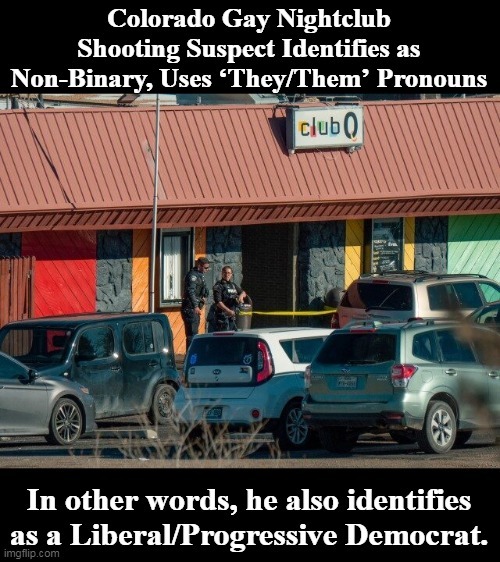
If a tragedy cannot be exploited for political gain, leftists quickly lose interest.
Huh?
Such is the case with Anderson Aldrich allegedly walking into Club Q in Colorado Springs and opened fire, killing five and injuring 19 others.
As to be expected – and without any detailed information – leftist journalists and activists immediately accused "MAGA" Republicans of inspiring the killings.
And they cited pro-gun advocates and people opposed to drag queen performances for children as the culprits.
Aldrich – adding bizarre to his already “non-Binary” disturbed state – has asked the court to use his preferred pronouns, They/Them.
LOL!
You just can’t make this up.
And with that in mind we’re turning over today’s rant to a familiar Financial$Matter reader, Scoob Martin.
Ruh, Ro!
Take it away Scoobie.
This is a case that probably would have become a non-stop media circus for the next several months had the shooter been an actual conservative against the trans agenda.
And with gender ideology and conservative principles being mutually exclusive, it’s all but impossible for corporate journalists to place the blame on the right-wing.
As a result, the event will be buried much like the Waukesha Massacre perpetrated by BLM supporter Darrell Brooks…one year ago.
Translation: they can't pin it on whitey as a hate crime.
We already know this person is crazy because they committed a mass murder...
So "it" stating that it is non gender binary (wtf ever that really means?) is just a reaffirmation of this fact...no?
Maybe Biden will now classify all homosexuals as terrorists like he did for Maga supporters. And then call it homocide.
LMAO!
Political Gain
The sick part is how these stupid journalists are faced with a self-identified trans person being charged with mass murder and they’re jumping at the chance to dismiss his subjective gender.
And then we also had the Walmart manager go berserk in Chesapeake, Virginia, killing at least six people and wounding several others before fatally shooting himself.
I guess this means we’ll never know his/her real gender or pronouns.
But he was the kind of guy you want to send Karen to when she insists upon seeing the manager…LOL!
So, just in time for the holidays we’re seeing more people ‘snap’ and it makes me wonder how many others are feeling the stress and near ready to pop...?
Black Friday may need a new name...
And for those who legally carry guns, shopping at Walmart should remind you of the American Express slogan to “don’t leave home without it.”
Thanks again, Scoob for that rousing rant.
As always, if you – our Dear Readers – have a rant you’d like to share then send it to us.
You never know whose life will be affected by it.
And if you want to see some NSFW rants then go (HERE).
Remember: We’re Not Just About Finance.
But we use finance to give you hope.
P.S. Don’t forget our Black Friday Special for our “…In Plain English Newsletter” at the ridiculously low annual price of $76.85 (normally $145) or monthly rate of $7.95 (normally $15) CLICK HERE.
Be sure to use the code word Thanksgiving at the checkout in order to get the discount.
************************************
Sincerely,
James Vincent
The Reverend of Finance
Copyright © 2022 It's Not Just About Finance, LLC, All rights reserved.
You are receiving this email because you opted in via our website.
Read the full article
0 notes
Text
“...As they created their special variant of childhood and parenting, Americans were creating a social revolution fully in line with the political changes that began with the famous revolt of 1776. Both rejected entrenched hierarchy, and embraced independence and more personal autonomy. Both revolutions were uneasy and often hazardous undertakings. Together they made the United States into a very strange place in the world. That strangeness is captured in many of the opinions voiced by articulate Americans in the first sixty years of the republic.
“Our children,” Nathaniel Willis declared in 1827 as he launched his new publication, The Youth’s Companion, “are born to higher destinies than their fathers.” This vision has become a cliché to us today. But it was alien to most Europeans and would have been unfamiliar to American colonists. For centuries in the Western world, elders reigned and were assumed to possess knowledge and wisdom as well as power. Their welfare and needs were primary and their dictates unquestioned. This perspective is still common in many parts of the world today. Lady Elphinstone of Scotland captured its essential meaning when she declared, “My children from the youngest to the eldest love me and fear me as sinners dread death. My look is law.”
Views like these dominated Old World values regarding the appropriate reverence and obedience of children toward their parents. American revolutionaries had rejected this tyrannical posture in the political arena. In the circumstances of the world they were creating, Americans also rejected such views as a guide to household affairs. Although Europeans, too, were changing their perspective on childhood as they absorbed the lessons of the Enlightenment, and as they responded to the political revolutions erupting throughout the continent, the social conditions of European life made it more difficult for them to change as rapidly or as fully as Americans in regard to how the generations treated each other.
Why and how had things become so different in the nascent United States? Historians of the American Revolution have long understood that the changes articulated in that event were deeper than politics, that they had roots in cultural and social life, and affected the domestic realm and private relations. American children, famed historian Bernard Bailyn speculated over fifty years ago, needed a different, more open- ended kind of schooling. Since they needed to adapt to the new circumstances of a changing landscape, following in their fathers’ footsteps was not good enough. That knowledge was often inadequate to the circumstances.
Individual resourcefulness and the willingness to adjust to the unexpected and to create the still unimagined became basic values as Americans defined a new type of individual adequate to the possibilities of the new world they were creating. Children, who were less constrained by ingrained habits, had an advantage over their elders in the American environment. At a time when European Enlightenment thinkers were seeking to throw off the shackles of custom and tradition, Americans reorganized their lives in ways that unselfconsciously adapted those perspectives, removing layers of tradition and encrusted custom.
Even before the Revolution, Enlightenment European thinkers, such as John Locke and Jean-Jacques Rousseau, were read with marked appreciation by Americans who believed that these philosophers’ views about children, and about childhood as a formative phase of life, were especially relevant to their environment. John Locke is best known today for political writings that helped to establish the basis for America’s commitments to liberty, for opposing tyrannical rule, and ideas that Jefferson and others used in formulating their views about freedom of religion and conscience. But Locke was also looked to as a pioneer in ideas about how children could be raised to become responsible citizens and trusted to exercise their independent judgment.
He believed that children were malleable and childhood was a time when habits were laid down that would shape later life. He urged parents to appeal to children’s reason, not to their fear of punishment. Fewer restraints and adult impositions during childhood and a willingness to accept a child’s natural inclinations as a basis for learning underwrote Rousseau’s more radical beliefs in the innate wisdom and natural sensibilities of children. Rousseau looked to rid society of traditional ideas and social patterns by giving children more leeway to grow and time to exhibit that wisdom.
In tracts written from the late seventeenth through the mid- eighteenth century, these two philosophers helped to shape modern ideas about children that were important throughout the West. For Americans eager to be informed, Locke and Rousseau captured the special importance of childhood to the ideals of a reformed society. By the beginning of the nineteenth century, questions regarding parents and children and what they owed each other were very much part of the American conversation. After the Revolution, Americans eagerly addressed parent- child relations, sometimes with considerable urgency, because they saw the Revolution and republican government as setting special requirements for childrearing.
Fathers’ injunctions, like kings’ dictates, were problematic in the new society they sought to create. The American revolutionaries spoke regularly of the rule of law and argued that they were trying to maintain liberties threatened by British imperial action. But even as they spoke about conserving older liberties, they turned toward more radical social notions. In attacking the legitimacy of the king— the most revered of earthly authorities— they undercut the unquestioned authority of fathers. That authority remained elsewhere the guiding basis for domestic and social relationships.
In France, whose own revolution similarly raised fundamental questions about the rule of kings and fathers, republican beliefs initially dismantled patriarchy after the Revolution of 1789, but it was reassembled within a decade as the French republic tumbled and fell. In the United States, preexisting conditions and the continuity of republican and democratic ideas created a context in which social and family changes were sustained and elaborated. Not only were old- fashioned fathers deeply suspect in the United States, but Americans were asking what kinds of children were needed to maintain the revolution that Americans continued to embrace.
This made matters regarding childrearing part of the national agenda from the very beginning of the republic. Most American historians have not fully appreciated how radically the American environment and the revolution that it spawned were revising the most fundamental of human bonds. European visitors to the United States in the half- century after the Revolution saw it clearly. As they witnessed the behaviors and demeanors of the old and the young, they witnessed a series of historically important changes. The great observer and French political theorist, Alexis de Tocqueville, devoted a chapter of Democracy in America to the unusual nature of American family relations.
Among chapters registering his observations about (and sometimes disdain for) Americans’ peculiar cultivation of the arts, their transformations of the English language, and their neglect of traditional philosophy, Tocqueville was much more admiring when describing “The Influence of Democracy on the Family.” That influence, he argued, was in line with other leveling effects of the greater equality experienced in the United States. “It has been universally remarked that in our time [1830s] the several members of the family stand upon an entirely new footing toward each other; that the distance which formerly separated a father from his sons has been lessened; and that paternal authority, if not destroyed, is at least impaired.”
Societies throughout Europe and the Americas were also starting to feel the crosswinds of change, as the Western world came under the influence of democratizing conditions, but Tocqueville found it to be “even more striking” in the United States. Speaking of young people beyond the earliest years, he observed: “The same habits, the same principles, which impel the one to assert his independence predispose the other to consider the use of that independence as an incontestable right.” In Tocqueville’s view, independence in children was more than a practice; it had become a conscious part of a child’s self- understanding. This all took place peacefully, since there was no struggle between the generations.
Fathers feel “none of that bitter and angry regret which is apt to survive a bygone power.” Instead the expectations had become an instinctive part of the culture as “the father foresees the limits of his authority long beforehand, and when the time arrives, he surrenders it without a struggle.” Tocqueville went on to contrast the quality of feelings in more traditional societies with those in the United States. In the one, the father “is listened to with deference, he is addressed with respect, and the love that is felt for him is always tempered by fear.”
But in democratic America, as fathers yielded authority, “the relations of father and son become more intimate and more affectionate; rule and authority are less talked of, confidence and tenderness are often increased, and it would seem that the natural bond is drawn closer in proportion as the social bond is loosened.” Tocqueville was probably too quick to identify these two— the social, with its weakened emphasis on hierarchy, and the emotional, whose qualities Tocqueville argued resulted in an increase of “tenderness” on both sides. We would do well, for the moment at least, to separate these two aspects of the changed relationship between parents and children.
Many memoirs from the period document the former; few tell us much about the latter. Tocqueville’s observations about greater warmth and affection may have been (and not for the first time) an instance of wishful thinking by a social observer eager to believe that natural “feelings” and natural “bonds” would grow when social ties were loosened. Somewhat later than Tocqueville, another observer of American domestic relations, Polish count Adam de Gurowski, concluded that in the United States, children matured early and were early “emancipated . . . from parental authority and domestic discipline.”
In this way, Gurowski accounted for the observations common at the time that “[c]hildren accustomed to the utmost familiarity and absence of constraint with their parents, behave in the same manner with other older persons, and this sometimes deprives the social intercourse of Americans of the tint of politeness, which is more habitual in Europe.” Many Europeans commented on the rude manners of American children, but few appreciated, as Tocqueville and Gurowski did, that this resulted not from parental laziness or indifference to child governance but from a different kind of disciplinary regime.
One who did and who made the contrast with European children explicit was the author of a volume called America as I Found It. “English children in the presence of strangers are reserved and shy. They feel that the nursery and school room are their proper sphere of action. . . . Most unlike to these is the sentiment of the American, both parent and child. The little citizen seems to feel at a surprisingly early age, that he has a part on the stage of the world, and is willing enough to act a little before his time.”
The notion that children believed they had a part to play on the stage of the world was an unusually effective way of seeing that American children had large expectations and they were early trained toward the appropriate habits of mind and demeanor. Probably nowhere else in the Western world could one visit the homes of respectable families and find children who so easily took part in the family circle and were so comfortably regarded as equals, not as subordinates or dependents.
In fact, throughout the West during the nineteenth century, middle- class opinion was endowing children with special appeal and setting childhood apart, and family practices were distinguishing children’s activities from those of their parents. While Americans, too, saw something precious and important about childhood as a stage of life, their cruder conditions and more demanding economy made it far less likely that children would inhabit an exclusive world in nurseries and at play away from the travails of the world.”
- Paula S. Fass, “Childhood and Parenting in the New Republic Sowing the Seeds of Independence, 1800–1860.” in The End of American Childhood: A History of Parenting from Life on the Frontier to the Managed Child
7 notes
·
View notes
Text
The beginning
This is the start if hopefully something great. The world is full of everchanging ever-flowing thoughts actions and word. I am excited to be part of this and want to do my part. I am sure many people won't agree with me and maybe some will. Maybe I will even influence the world for the better in my own little way This is the start of my “BLOG”. I hope you will respect the rules of human decency and respect my opinion and I would gracefully take any arguments comments or poems as part of this experience. Thank you for your time
That being Said...
Dear US Senate
I am young and I know not what life has to fully offer. It kills my heart when people dismiss an argument based off of political party rather than statements. Personally, I identify as a right-wing conservative republican. I am dumbfounded when people dismiss my rhetoric purely because of my stance in American politics. Today was in debate club. I was one of four students total and the only Republican in the room with two democratic students, one left-leaning libertarian, and two extremely liberal democratic teachers.[All of these are self-proclaimed titles] The discussion was President Trump’s First two years in office. which in itself is a problem. there are SO MANY things to argue. First up was President Trump ‘s possible executive order to overthrow the 14th amendment. Now I struggle with forming arguments. It takes me a minute. Once I had all my words were in order I waited for my chance to speak. Before I could fully form my argument and make a full sentence Mrs.Whatsit interjected with the full force of her history degree from somewhere, [Mrs. Whatsit is not meant to be derogative I merely do not know her name because she is not one of the debate club faculty advisors, therefore, I cannot assign a proper psudonym] stating something along the lines of ... honestly, I can’t remember, but she was a little loud in a classroom setting but that's beside the point. If I had my chance to fully speak here is what I would have said
“The point of the fourteenth amendment was to over-rule Dred Scott v. Sandford (1856) that decision said “Persons of African descent cannot be, nor were ever intended to be, citizens under the U.S. Const. Plaintiff is without standing to file a suit. The Property Clause is only applicable to lands possessed at the time of ratification (1787). As such, Congress cannot ban slavery in the territories. Missouri Compromise is unconstitutional. Due Process Clause of the Fifth Amendment prohibits the federal government from freeing slaves brought into federal territories” ["Dred Scott Case". New International Encyclopedia. 1905.]. This means that This means that slaves were considered property. The fourteenth amendment makes all people that are born on United States soil citizens. On the front this seems like a good thing. The Scot Dred case was a ridiculous case and a product of a baseline of inequality that started with the use of slaves in the colonial age. After the civil war ended slaves then freed were just lurking. The scot Dred culmination made the emancipated not citizens because they were slaves until December 1865. The fourteenth amendment decreed that all people that had been born in the United States were now citizens. This was so the government could absorb all the emancipated people into the system. This was the best decision President Lincoln could have made. But is it right for the modern age? The Answer is no. The worst possible example is an illegal immigrant coming across the border nine months pregnant and immediately having a baby on the taxpayer dollar. In 2013 roughly 295,000 babies were born into the United States to illegal immigrants. At an approximate $8807 per birth that works out to two and a half billion dollars spent on anchor children in 2013 alone. Wouldnt that be better spent on acclimating veterans helping the homeless or perhaps even building that lovely wall”
Thank you for your time,
Angry Republican
1 note
·
View note
Text
What a Socialist Victory Can Teach Us in Our Fight for Freedom – Lowdown on Liberty
Last week, New York saw what could’ve been the biggest primary-election upset in recent history, with Alexandria Ocasio-Cortez defeating the number four Democrat in the House, Joe Crowley. Ocasio-Cortez, a 28-year-old, self-identified democratic socialist, swung nearly 50 points in two weeks to unseat the 10-term incumbent in New York’s 14th district. Now, for those of us not in favor of socialism, the recent feeling of a surge in its popularity can be disheartening. Rather than sulk however, it’s important to see the positives every situation holds for your own cause, and in this case, we should be asking ourselves, what can a socialist victory teach us in our fight for freedom?
Since her victory, Ocasio-Cortez has been thrown into the spotlight, making appearances on shows like The View and receiving invites for interviews on just about every media outlet. During her interview on The Late Show with Stephen Colbert, she was asked to define “democratic socialism”, where she said: “I believe that in a modern, moral, and wealthy society, no person in America should be too poor to live.” It should come as no surprise that this was met with roaring applause, which, for libertarians, is our first place to learn a lesson.
Jason Stapleton often likes to say that, “in the arena of ideas, we cannot lose,” implying that we hold the truth on our side. The only problem is that, when winning requires swaying the emotionally-charged voting bloc of the American public, choosing facts over feelings at the wrong time can actually prove harmful to your chances; and knowing the time and place for it can be the difference between winning and losing. Sure, we can sit amongst ourselves and easily pick apart Ocasio-Cortez’s ridiculous answer simply by asking her to point out who in today’s society actually wants people to be too poor to live, but that does nothing to draw in interest to our own ideas. And when libertarians are asked similar questions, or even put in a corner about our unorthodox views, responding with a “what’s radical about non-violence?” can garner infinitely more attention from someone hearing our message for the first time than going into a breakdown of the Austrian business cycle theory.
I’m not saying we need to abandon our logic altogether, but libertarians have always fallen a bit short in their messaging, especially when it comes to strategy. This is partially due to libertarianism being a descriptive ethic, or simply pointing out the truth about how things are; as opposed to prescriptive, essentially claiming how things ought to be. And to an uneducated voter, that can lead to confusion and a rejection of our ideas. For example, libertarians often say that universal healthcare, when broken down, equates to theft and slavery. While this may be true, it only appeals to those willing to set emotion aside in favor of logic, which, unfortunately, appears to be the opposite of what most Americans are taught in school today. A prescriptive example could be Bernie Sanders saying, “no one should go without healthcare in the US today.” Although the latter lacks severely in actual substance, it manages to give people something to grab onto emotionally, essentially providing a hook for new audiences while also serving to lower their guard.
We can see the effectiveness of this strategy in both major parties today, too. Democrats love to pitch things like a “living wage” and healthcare as a right, as a way of appealing to the emotions of American voters. And how often do we hear them dissemble when asked to define what those mean? Yet, people attracted to that idea seem to repeat it ad nauseam anyway. And while it may be more prominent on the left, the biggest example of this technique comes from Donald Trump. His slogan of “Make America Great Again” could be the single most effective instance in recent memory. The obviously empty slogan gives republicans an idea to look forward to that is both easily digestible and impossible to disprove. Just like with Orcasio-Cortez’s empty definition of democratic socialism, you’d also be hard-pressed to find someone who doesn’t wish to make their own country “great” again, even though each person’s idea of great may differ widely. And that’s the attraction, it triggers a positive image in the voter’s head, and allows them to create their own specific definition. And as we can see, regardless of party, these emotional appeals work wonders by giving people an idea to cheer for that appears to be a higher cause; but in order to reach long-term success, you also need something else libertarians seem to be missing.
With each and every successful campaign, what inevitably must follow the intangible ideas are simple, concrete goals to measure success. Philosophical ideas are a good starting point to reel people in, but they’re only good for a short while. What keeps the momentum going is where the political rubber meets the road; people need something to rally behind. We saw this with Obama, where he followed up his “hope and change” idea with calls to close Guantanamo and end the wars in Iraq and Afghanistan. Trump followed suit with his “build the wall” chants and his promises to bring back jobs. Even Bernie Sanders had his $15 minimum wage and Medicare-for-all promises. These are simple things that can give people something to work and fight for. And with the appeal to emotion starting them out, people are less likely to care if the follow-up ideas are actually workable. Did people care when we explained that Obamacare would fail, that higher minimum wages cause more unemployment, or that building the wall will be ineffective? No, because not only are they already hooked with an emotional investment, but they see themselves as the good guys either way, due in large part to the way these messages were marketed to them.
Now, which one of Gary Johnson’s slogans had any of that? Did “be libertarian with me”, “live free”, “#TeamGov” or “You in?” sound like grand ideas people will rally around? Of course not, and when you pair it with vague campaign promises of “we’re socially liberal and fiscally conservative”, or “we’ll let the market sort it out”, it’s no wonder we couldn’t even break 5% nationally against the two most unpopular candidates in modern history. On the other hand, what is it that everyone remembers from the Ron Paul campaign? End the Fed. It was everywhere. His “Restore America Now” and “Ron Paul Revolution” slogans reminded us all of the broken promises, endless wars, and out of control monetary policy we’ve come to hate, and also worked to inspire newcomers to feel like this was the moment to join and help change it. By coupling all that with the measurable goal of ending the Fed as a solution to those problems, it proved to be a center point for people to rally and organize around. And that’s exactly the kind of campaign we need again.
We’ve seen the continual success our political opponents have gotten already from these very basic strategies. If we hope to be competitive anytime soon in the political arena, we need to realize that not everyone who may come into libertarianism is going to be a rational economist who just powered through Human Action, and while having an objective, moral ethic is something that can win us arguments in the long-run, we need to “read the room” in regards to politics today, and react accordingly if we hope to stand a chance at the ballot box.
Featured Image
The post What a Socialist Victory Can Teach Us in Our Fight for Freedom – Lowdown on Liberty appeared first on Being Libertarian.
from WordPress https://ift.tt/2KGXUoO
via IFTTT
1 note
·
View note
Link
Imagine, as I often do, that our world were to end tomorrow, and that alien researchers many years in the future were tasked with reconstructing the demise of civilization from the news. If they persevered past the coverage of our President, they would soon identify the curious figure of the millennial as a suspect. A composite image would emerge, of a twitchy and phone-addicted pest who eats away at beloved American institutions the way boll weevils feed on crops. Millennials, according to recent headlines, are killing hotels, department stores, chain restaurants, the car industry, the diamond industry, the napkin industry, homeownership, marriage, doorbells, motorcycles, fabric softener, hotel-loyalty programs, casinos, Goldman Sachs, serendipity, and the McDonald’s McWrap.
The idea that millennials are capriciously wrecking the landscape of American consumption grants quite a bit of power to a group that is still on the younger side. Born in the nineteen-eighties and nineties, millennials are now in their twenties and thirties. But the popular image of this generation—given its name, in 1987, by William Strauss and Neil Howe—has long been connected with the notion of disruptive self-interest. Over the past decade, that connection has been codified by Jean Twenge, a psychology professor at San Diego State University, who writes about those younger than herself with an air of pragmatic evenhandedness and an undercurrent of moral alarm. (An article adapted from her most recent book, “iGen,” about the cohort after millennials, was published in the September issue of The Atlantic with the headline “Have Smartphones Destroyed a Generation?” It went viral.) In 2006, Twenge published “Generation Me: Why Today’s Young Americans Are More Confident, Assertive, Entitled—and More Miserable Than Ever Before.” The book’s cover emblazoned the title across a bare midriff, a flamboyant illustration of millennial self-importance, sandwiched between a navel piercing and a pair of low-rise jeans.
According to Twenge, millennials are “tolerant, confident, open-minded, and ambitious, but also disengaged, narcissistic, distrustful, and anxious.” She presents a barrage of statistics in support of this assessment, along with anecdotal testimonials and pop-cultural examples that neatly confirm the trends she identifies. (A revised edition, published in 2014, mentions the HBO show “Girls” six times.) Twenge acknowledges that the generation has come of age inside an “economic squeeze created by underemployment and rising costs,” but she mostly explains millennial traits in terms of culture and choice. Parents overemphasized self-esteem and happiness, while kids took their cues from an era of diversity initiatives, decentralized authority, online avatars, and reality TV. As a result, millennials have become irresponsible and fundamentally maladjusted. They “believe that every job will be fulfilling and then can’t even find a boring one.” They must lower their expectations and dim their glittering self-images in order to become functional adults.
This argument has a conservative appeal, given its focus on the individual rather than on the structures and the conditions that govern one’s life. Twenge wonders, “Is the upswing in minority kids’ self-esteem an unmitigated good?” and then observes, “Raising children’s self-esteem is not going to solve the problems of poverty and crime.” It’s possible to reach such moralizing conclusions even if one begins with the opposite economic premise. In “The Vanishing American Adult,” published in May, Senator Ben Sasse, Republican of Nebraska, insists that we live in a time of generalized “affluenza,” in which “much of our stress now flows not from deprivation but, oddly, from surplus.” Millennials have “far too few problems,” he argues. Sasse chastises parents for allowing their kids to succumb to the character-eroding temptations of contemporary abundance and offers suggestions for turning the school-age generation into the sort of hardworking, financially independent grownups that the millennials have yet to become.
The image of millennials has darkened since Strauss and Howe walked the beat: in their 2000 book, “Millennials Rising,” they claimed that the members of this surging generation were uniquely earnest, industrious, and positive. But the decline in that reputation is hardly surprising. Since the nineteen-sixties, most generational analysis has revolved around the groundbreaking idea that young people are selfish. Twenge’s term for millennials merely flips an older one, the “me generation,” inspired by a 1976 New York cover story by Tom Wolfe about the baby boomers. (The voluble Wolfe, born in 1930, is a member of the silent generation.) Wolfe argued that three decades of postwar economic growth had produced a mania for “remaking, remodeling, elevating, and polishing one’s very self . . . and observing, studying, and doting on it.” The fear of growing selfishness has, in the forty years since, only increased.
(Continue Reading)
95 notes
·
View notes
Link
via Politics – FiveThirtyEight
Welcome to FiveThirtyEight’s politics chat. The transcript below has been lightly edited.
sarah (Sarah Frostenson, politics editor): Next week, former President Donald Trump’s impeachment trial is finally scheduled to begin, which should give us some insight into how far Republicans are willing to go to distance themselves from Trump. (Hint: not much.)
But first, House Republicans must face a dilemma of their own, which in many ways underscores the dynamics we’ll see at play in the upcoming impeachment trial: Either strip the No. 3 GOP House leader, Liz Cheney, who voted to impeach Trump and publicly rebuked him, of her leadership role or strip Rep. Marjorie Taylor Greene, who made racist and conspiracy-ridden comments before she got to Congress but who has Trump’s ear, of her committee positions. (House Minority Leader Kevin McCarthy has, at this point, signaled that he condemns Greene’s previous comments, but he will not look to strip her of her committee assignments and instead blames Democrats for politicizing the issue, as they will push the issue to a vote.)
Meanwhile, Senate Minority Leader Mitch McConnell has thrown his support behind Cheney and without directly naming Greene made it clear in a statement to The Hill on Monday that he thought her “loony lies and conspiracy theories” were a “cancer for the Republican Party.” But it’s also possible that McConnell and other members of the Republican establishment are just out of touch with where the party is headed.
What do these two very different calls for action in the House tell us about the direction the GOP is headed and Trump’s continued influence in the party?
lee.drutman (Lee Drutman, senior fellow at New America and FiveThirtyEight contributor): I think it tells us that the party is deeply torn between two theories of how they win elections. One theory is that the GOP has to play to the Trump base to keep them voting, because these are the voters most likely to not show up. The other theory is that if the GOP gets too associated with the “loony” wing, they can’t win suburban districts. Both theories are probably right, which is why the party is so torn.
perry (Perry Bacon Jr., senior writer): I am not sure what we’re seeing play out now is really about Trump specifically. Cheney’s joining the Democrats to back Trump’s impeachment is viewed as an anti-Republican/pro-Democrat action by the party’s conservative base and conservative lawmakers, so that’s Cheney’s problem. Her move also broke with the “own the libs” ethos of today’s GOP. Greene, on the other hand, at least before she officially started in Congress, went too far in the “own the libs” direction — her campaign literature showed her holding a gun and calling herself the “Squad’s Worst Nightmare.”
And the GOP mainstream is somewhere between Cheney and Greene.
Kaleigh (Kaleigh Rogers, tech and politics reporter): It seems to me that the party is trying to thread the needle, neither distancing themselves from Trump nor actively conjuring his ghost, in an effort to reap all the benefits of Trumpian politics without the pitfalls of Trump himself. And it’s understandable why. As Julia Azari wrote for FiveThirtyEight in her look at the future of the Republican Party, Trump capitalized by tapping into white grievance, and that is only going to continue.
The GOP can’t just put Trump behind them if they want to maintain voter support: 65 percent of Republicans said they were much or somewhat less likely to support a candidate who voted to impeach Trump, according to a recent survey from Echelon Insights, and a Washington Post-ABC News poll last month found nearly 6 in 10 Republicans said the party should “follow Trump’s leadership” rather than move in a new direction.
The notion that support for Trump is somehow a fringe ideology or doesn’t represent the broader GOP doesn’t bear out. And, to me, Greene represents the “Trumpian with Trump” part of the equation that they may be trying to tamp down without fully censuring her.
lee.drutman: Perry’s onto an important point about the “own the libs” ethos. I haven’t seen any polling that gets at this directly, though self-identified “Trump Republicans” (those who consider themselves “mostly supporters of former President Donald Trump”) are much less likely to want to compromise with Biden than “Party Republicans” (those who consider themselves “more supporters of the Republican Party.”)
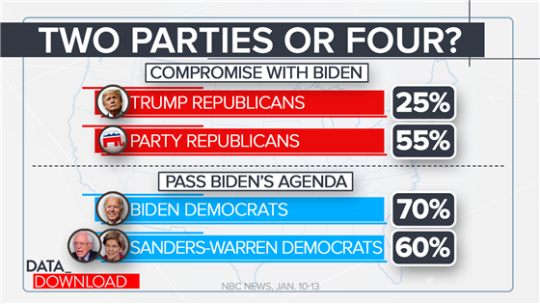
laura (Laura Bronner, quantitative editor): I thought that stat was really illuminating, Lee, especially because it shows that the split within the Democratic Party is not nearly as large as the split within the GOP — just a 10 percentage point difference compared with 30 points within the GOP. Of course, the question is about working with Biden, so that might explain some of that gap, but with Biden in power now, that difference still points to a key discrepancy about how different factions in the two parties think about the right way forward.
Kaleigh: And that split would be particularly concerning for Republicans if Trump was to make good on his threat to start a third party.
lee.drutman: Indeed, Kaleigh. According to that NBC poll, Republicans are equally split between “Trump Republicans” and “Party Republicans.”

laura: I’m somewhat skeptical of polling about a potential third party, though, which is how I feel about polling about a hypothetical party landscape in general.
sarah: More than two* parties in American politics!?! You all jest.
*Two successful parties, I should say.
Agree with Laura on this one.
lee.drutman: Well, we’re not going to get more than two successful parties until we change the way we vote. A more proportional voting system would allow those different parties to operate independently of one another. And this would be a very good thing, as I argue in my book, Breaking the Two-Party Doom Loop: The Case for Multiparty Democracy in America.
sarah: Kaleigh, I was thinking about Julia Azari’s piece, too. On the one hand, I think Perry’s point about this not entirely being the latest loyalty test to Trump is right. Cheney’s actions just aren’t representative of where the party is (i.e., compromising with Democrats).
One question I had, though, and something Julia mentioned in her piece, was that when it comes to someone like Greene or Madison Cawthorn, another GOP member of the pro-Trump faction is that “there is still a key difference between them and Trump in terms of power and influence: A group of representatives can make up a faction of a party, but only the president serves as the party’s mouthpiece.” What do we make of that? It’s something Sen. Marco Rubio also echoed earlier today in a tweet.
Reporting that a politician believes in/flirts with conspiracy theories is legit, but the attention they get should be proportional to their ability to influence actual public policy
Don’t make them famous, help them raise money or elevate conspiracy theories
— Marco Rubio (@marcorubio) February 3, 2021
That is, do we have a sense of how representative of the GOP someone like Greene is, or someone like Rep. Lauren Boebert is? Or Cawthorn?
perry: I happen to think Republicans are split in three, not two: the rule of law/very pro-democracy people (Rep. Adam Kinzinger and Cheney; Sen. Mitt Romney), the anti-democratic folks (Trump, Greene) and then a big group of people (McConnell, most other Republicans) who are fine with laws making it harder for Black people to vote but uncomfortable with more overt actions to disqualify Black people from voting, like disqualifying the results from the Detroit area, for example.
sarah: We’ve touched on it a little already, but how much data do we have on the share of Republicans who share Greene’s POV?
In other words, how big a slice of the GOP is in Greene’s faction?
lee.drutman: So, I think we need to define what Greene’s POV is.
Is it just basically supporting QAnon?
sarah: Or is it espousing anti-establishment views more broadly?
lee.drutman: If it’s just QAnon, there’s not wide support even within the GOP.
Kaleigh: Well, according to that Echelon Insights poll I cited before, 43 percent of Republicans think Trump won the election, so this is not a small faction within the party.
lee.drutman: Similarly, 41 percent of adults who identify as Republican say QAnon is good for the country, according to a poll by Pew Research.
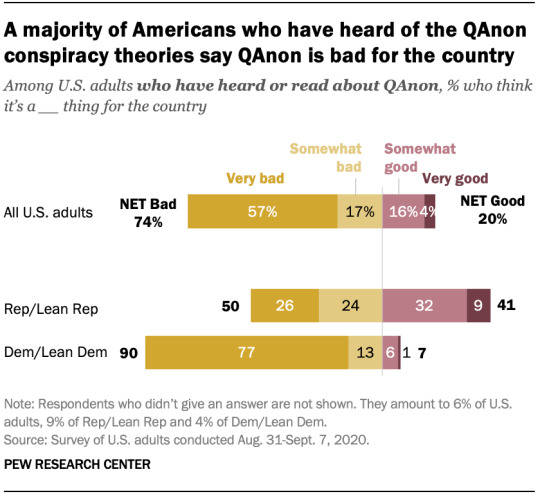
And about 23 percent of Republicans still said in December that they believe in the QAnon conspiracy theory, according to an NPR/Ipsos poll.
I think the basic calculus in the Republican Party is that they are going to need these Q voters to show up.
laura: Yeah, there was also an interesting (and mildly terrifying) Ipsos poll recently that shows that when asked a series of nine true-or-false statements around misinformation, just 31 percent of Republicans got four or more correct. That’s compared with 88 percent of Democrats. So, the misinformation scourge has really taken hold of the Republican Party, particularly on election-related misinformation (i.e., whether Biden legitimately won, whether voting machines falsified votes, etc.). Just about one-fourth of Republicans gave the correct answer, though many said they didn’t know. Additionally, just 23 percent of Republicans said the Capitol rioters weren’t undercover Antifa members. And on QAnon, less than half said it was false that “a group of Satan-worshipping elites who run a child sex ring are trying to control our politics and media.”
lee.drutman: I saw that too, Laura — it’s interesting what they got correct and what they didn’t.
Kaleigh: There’s also a real resistance among the right in general to reining in politicians too tightly. They reject what they see as “thought policing” and gatekeeping on the left and consider it a source of pride that there is room for a wide breadth of ideology within the Republican Party as part of its “big tent” branding. So, even voters who reject QAnon might not want to see QAnon supporters rejected wholesale. And this is something that party leaders like McCarthy might lean on if pressed about why they aren’t censuring Greene more explicitly, for example.
The risk is that leaning into the Q contingent will push away more centrist conservatives, which is why I think Republicans are starting off with a kind of quiet acceptance rather than an embrace or rejection of these ideas — they don’t want to scare off either end of the spectrum.
lee.drutman: Another thing about Q supporters is that they are generally very anti-establishment. It can be difficult to distinguish between the Q conspiracy and generally anti-establishment views.
Kaleigh: And QAnon is a very a-la-carte kind of conspiracy! You can believe parts of it and disbelieve others and still feel like a part of that overall community.
sarah: Yeah, it’s hard for me to make sense of a lot of this polling. This was published by The New York Times’s Emily Badger long before the attack on the Capitol on Jan. 6, so keep that in mind, but there does seem to be some evidence that Republicans don’t always literally mean what they say in polls.
That is obviously fraught, because we saw what four years of taking Trump seriously and not literally culminated in; however, I do think Greene’s POV is one that is more anti-establishment than core conservative policies, and that is gaining traction in the party.
The Morning Consult poll showing that Cheney’s and McConnell’s favorability is down among Republican voters should be taken as a sign of where large sections of the GOP base are headed. And maybe that’s a sign that the GOP establishment types, like Cheney and McConnell, are increasingly out of touch.
Lee wrote last summer that there were already very few moderate GOP members left, and with high-profile retirements of GOP moderates like Pat Toomey and Rob Portman in the Senate, it does seem as if that wing of the party is shrinking. How does the current battle over Cheney and Greene in the House encapsulate this?
perry: The anti-establishment wing was already big and growing in the electorate. I think they are now growing increasingly big in the House. The Freedom Caucus is larger, for instance. And in my view, McCarthy is really limited in how he can take on Greene because the House members aren’t really inclined to do that. The members who rejected the election results are pretty anti-establishment, and they are the majority. But in the Senate, the anti-establishment wing hasn’t taken over yet, so you have lots of senators defending Cheney and opposed to Greene.
I think the Romney wing (anti-Trumpism) is smaller than the Greene wing (very pro-Trumpism) on the Hill, but the Rubio/McConnell wing (more generic Republicans) is way bigger than each of those other two.
lee.drutman: But the anti-establishment wing is growing in the Senate. If you look at who supported overturning the election, it was a lot of recently elected Republicans (either in ’20 or ’18): Tommy Tuberville, Rick Scott, Roger Marshall, Cindy Hyde-Smith, Josh Hawley, Cynthia Lummis. Ted Cruz has been around a little longer, though, as has John Kennedy.
sarah: Democrats in the House will now push the situation with Greene to a floor vote to strip her of committee assignments. Is this a risky move for Democrats?
One thing I’m struggling with is how this is substantively different from what happened to former Rep. Steve King — other than the fact that he made those comments while he was a congressman.
lee.drutman: Well, one big difference is that stripping King of a committee assignment was more significant, since he was on the Agriculture Committee, which meant a lot to his Iowa constituents. My sense is that Greene, though, could care less about committee work, and so stripping her of committee assignments will only make her more powerful as an anti-establishment figure.
perry: The most important thing McCarthy has done, at this point, is meet with Trump in Florida. It was the opposite of a power move. It was basically kissing the ring and almost suggesting Trump is the boss of the House Republicans.
I find these “what Democrats should be doing” discussions kind of hard to have. If the other party is heading in an anti-democratic direction, they don’t have a lot of great choices. Ignoring the behavior could lead to more of it, and condemning it creates the risk of tit-for-tat, but I think we are well past this now. Republicans have suggested they’ll go after Rep. Ilhan Omar’s committee assignments, but it’s not just that Omar has to worry about congressional Republicans taking her off committees if they have the majority — she has to worry about them also encouraging their supporters to kill her right now, as does fellow Squad member Rep. Alexandria Ocasio-Cortez.
The remarkable thing about where we are now is that Cheney has been doing some outreach to fellow Republicans about her vote to impeach Trump, trying to rebuild whatever goodwill she might have lost. Greene, on the other hand, is not backtracking at all.
laura: My impression is that after Jan. 6, there may have been somewhat of a potential opening: For a while there, even a substantial chunk of Republicans were shocked about the Capitol riot, and it seemed to me at least that they were more willing to consider how that event was tied to the party itself: Right after the riot, 39 percent of Republicans thought their own party was on the wrong track, and 36 percent disapproved of Trump’s handling of the situation.
perry: You mean GOP voters or members?
laura: I mean voters — in polls at least, many seemed to express shock. But also, just 17 percent of Republicans in our tracker of public opinion said they supported Trump’s impeachment when we launched. That dipped some, but not much.
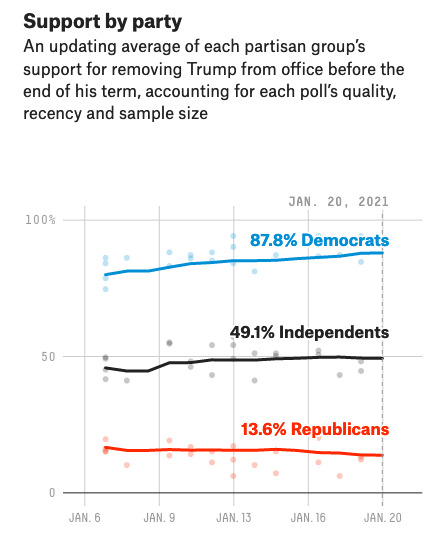
But I’m thinking GOP members of Congress, too. Cheney is a prominent example.
lee.drutman: Laura, I admire your capacity for hope post-Jan. 6.
I think what’s happening here, though, is an example of elite leadership operating on public opinion. Following Jan. 6, enough Republican leaders were expressing criticism that some Republican got the idea that there was enough support to say they support impeachment.
perry: It seems like members — McConnell, in particular — saw Jan. 6 as a way to break not only from Trump but from the kind of “own the libs” style of the party. But the party’s base and its activist core wasn’t there then (and isn’t there now). In fact, McConnell faced an effort in Kentucky to have him rebuked in a GOP party resolution. There was also an effort to start primarying the members who voted for impeachment.
And the activists seem to have succeeded in getting the party leaders to back off from any real change.
sarah: And now that elite GOP criticism is more muted, we see a dip in public opinion, as Laura said?
lee.drutman: Exactly. Once Republicans got in line, Republican voters followed the elite cues.
sarah: So where does that leave us with the upcoming impeachment trial? Is it the latest litmus test of GOP support for Trump? Or is that the wrong way to think about it? And how does it tie into these issues we’re seeing play out in the House over Cheney and Greene?
perry: So I think the story is party activists/Fox News pushing members to back off any rethinking about moving on from Trump or Trumpism. Then members got voters to stop rethinking — that sequencing is important.
McCarthy is less powerful than Fox News, in short.
lee.drutman: That seems exactly right, Perry.
It seems as if everybody just wants to be over and done with the impeachment trial, and as a result, it will go somewhat quickly. Democrats have their agenda to pass, and Republicans don’t want to have to dwell on anything potentially divisive within their party. The sooner they can get to rediscovering the importance of “fiscal responsibility,” the happier they will be.
laura: In looking at polls on average support for the impeachment trial, one interesting thing that stood out to me is that there is greater support for barring Trump from office — around 57 percent overall support that — compared with convicting him (51 percent support this). And that split exists among Republicans, too: 19 percent support barring him from office, compared with 12 percent who support convicting him.
Of course, it’s unclear — and unlikely — that Trump can actually be barred from office absent a conviction.
perry: The impeachment trial has already happened on the conservative side.
The party activists balked at the idea of convicting Trump, the party leaders heard that and quickly found a position that accommodated the base’s activists: A president can’t be convicted after he leaves office.
But I don’t think this is necessarily a show of support for Trump — impeachment was a way for the libs to own the conservatives, and the GOP was never going to let that happen.
Kaleigh: I concur. Any Democrats with dreams of this impeachment trial being anything more than a repeat of Trump’s last impeachment trial are going to be disappointed.
sarah: On that note, are there any bigger implications or takeaways if impeachment fails for the second time in the Senate?
lee.drutman: Now that Republicans have latched onto a theory that this impeachment is somehow unconstitutional, they can shake their finger at Trump’s actions and distance themselves from it but still say this would set a bad precedent, that voters have already made their choice, that we should move on, etc. Democrats know this so they just want to put stuff in the historical record for posterity.
laura: In the 2019 impeachment trial, by the end of the process, 61 percent of voters thought impeachment was a bad use of time — including 37 percent of Democrats. One can only imagine that share would be even higher now that Trump’s survival in office is no longer at stake.

perry: I don’t expect we will have future presidents incite riots at the Capitol or encourage foreign nations to investigate their political rivals, so I don’t think we can draw much from these Trump episodes. The Democrats basically had to impeach him in both instances. Those were very serious offenses.
Kaleigh: I agree with Lee that there’s this fatigue among the general public. After the election, the pandemic still upending everyone’s lives, and the economy, I think the average citizen might not want to have to think about anything “big” like impeachment right now…as depressing as that is for politics reporters.
lee.drutman: A lot will happen over the next two years. By the time of the next election, and by the time of the next Republican presidential primary, what’s happening now will be a distant memory.
sarah: But the divisions we’re seeing play out in the Republican Party won’t be.
lee.drutman: Maybe, maybe not. Once the Democrats start passing legislation, Republicans can unite in opposing it, just like they did in 2009-2010.
0 notes
Text
You Forgot The Unisex Bathrooms
Originally Published on June 20, 2015 on Eichy Says
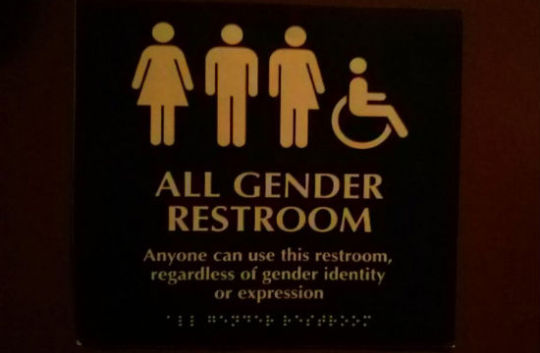
Many of you may remember, back in 2004, when same-sex marriage was a contentious topic as part of the national dialogue. Karl Rove led the Bush Administration and the Republican Party in turning it into a “wedge issue” to mobilize evangelicals and socially-conservative voters.
Meanwhile, countless Democrats shied away from the discussion – either taking middle-of-the-road stances that embraced civil unions, or simply sidestepping the issue altogether (when asked for their opinions on it). Some brave progressive Democrats embraced gay marriage outright, while a handful of conservative Democrats scoffed at how even the mere compromise of allowing same-sex civil unions would be “going too far.”

The GOP used that hot button issue as a way of motivating fundamentalists to flock to the Bush/Cheney ticket – and, in the same fell swoop – dividing establishment Democrats over how to address it.
This tactic was particularly effective in the Deep South, where it (at least in part) helped give the edge to Republican candidates farther down the ticket (as the GOP picked up U.S. Senate seats in Louisiana, Georgia, Florida, South Carolina, North Carolina, and, in the Midwest, South Dakota).
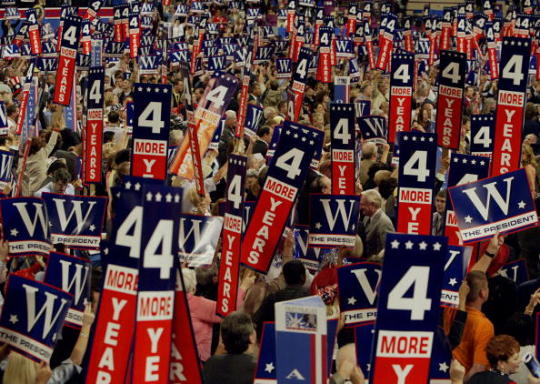
I was a college student at the time, and my campus held a televised debate on this topic that spring. Unlike the screaming matches from CNN’s 1982-2005 debate show, Crossfire, this exchange (hosted by our student-run closed-circuit campus TV station) offered civilized decorum from participants on both sides. Two of my friends from our on-campus LGBT student organization, Marcy and Greg, argued the “pro” side; representing the “con” side were the then-president of the College Republicans along with a local youth ministry leader.
My favorite part of the debate was when the College Republicans’ chapter president expressed that legalizing same-sex marriage could supposedly become harmful by causing confusion in terms of gender roles. He added, as an afterthought: “How long will it be before we stop having separate restrooms for women and men?”
To which Marcy replied, casually and matter-of-factly:
“Well, you forgot the unisex bathrooms.”
And the audience (admittedly filled with college-aged supporters of same-sex marriage) proceeded to laugh uproariously. But not out of ridicule – their laughter was largely supportive...due to Marcy having pointed out the absurdity of the guy’s logic.
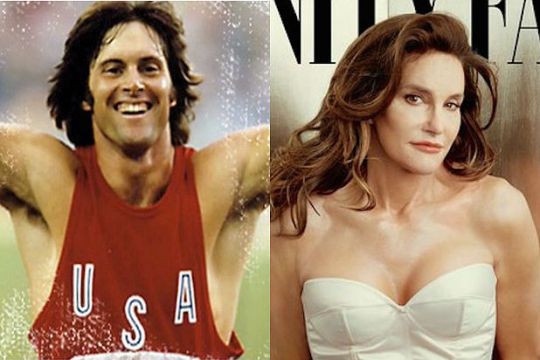
In recent weeks, the public glimpse that Caitlyn Jenner has given us into her gender-based transformation only underscores what a continuing debate this will be. Jenner, who has transitioned out of her former identity as a beloved Olympian named Bruce to a woman who now will be able to live her true self, is receiving a largely positive response from Americans – but also a firestorm of negativity from social conservatives and paleoconservatives who seem to believe rigid gender roles should still be promoted across-the-board.
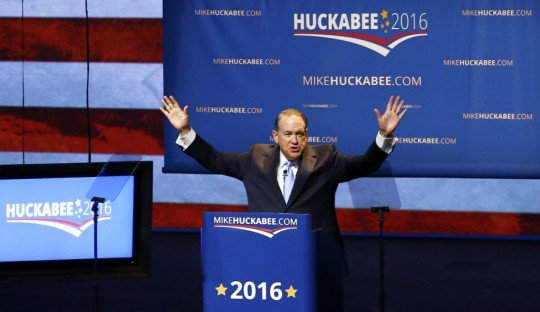
These latter outdated attitudes were echoed by former Arkansas Governor (and current Republican presidential candidate) Mike Huckabee during a Nashville campaign stop earlier this month.
While speaking in front of the National Religious Broadcasters Convention, Huckabee opined
:
Now I wish that someone had told me that when I was in high school that I could have felt like a woman when it came time to take showers in PE. I’m pretty sure that I would have found my feminine side and said, ‘Coach, I think I’d rather shower with the girls today.’ [in response to audience laughter] You’re laughing because it sounds so ridiculous, doesn’t it?
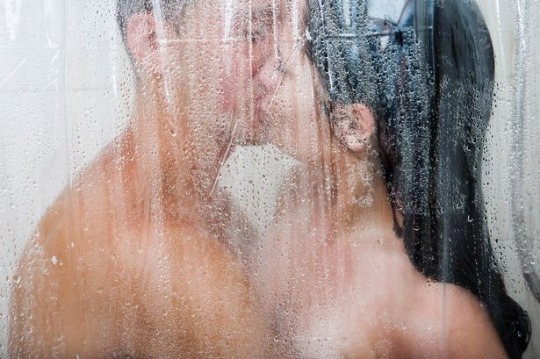
It’s clear that Huckabee is missing the point (or, he’s intentionally trying to misrepresent the discussion in order to advance his own twisted ideology).
Gender-neutral spaces are not about forcing people outside of their comfort zones. Rather, it’s a solution to create “safe spaces” for people who don’t cling to gender binaries...as well as families who want their children to be protected.
Many TV fans recall the 1997-2002 legal dramedy Ally McBeal, which was set in a law firm with its iconic unisex restroom frequented by female and male employees alike.

But life often imitates art. A growing number of public meeting places, recreational facilities, college campuses, and even K-12 schools, are retrofitting their communal areas with bathrooms or changing rooms accessible to citizens of all gender identities.
Historically, the trend of segregating public restrooms in the Western World began in the early-Eighteenth Century, and picked up steam (particularly in America) throughout the Nineteenth and Twentieth Centuries. The U.S. seems to maintain some of the most puritanical attitudes toward shared-gender spaces, as many restroom/changing areas throughout Europe are unisex in the modern era.

Yet, sex-segregated spaces have historical precedent, as well. Ancient Greek and Ancient Roman societies mandated separate public bathing areas for males and females. Japanese onsen are geothermally-heated hot springs – with some indoors, some outdoors, some sex-segregated, and some mixed gender.
My view is that history, when coupled with contemporary social norms, would suggest there can be room for both options in our society. Because of the status quo favoring sex-segregated private spaces, it’s incumbent upon those of us who support modernized options to make a case for them.
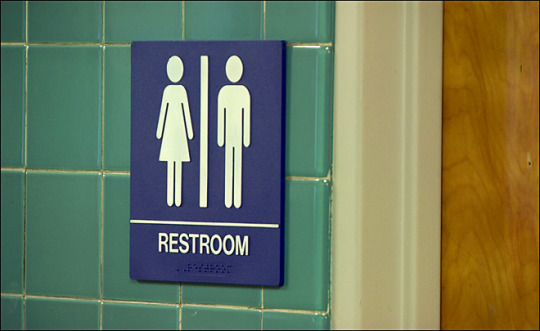
The first – and perhaps timeliest – benefit of having more unisex bathrooms is to provide spaces where transgender people can feel more comfortable. Visually speaking, people who are transitioning from male-to-female or female-to-male are often mistaken by others for the opposite sex of that with which they identify. This can lead to awkward encounters and misunderstandings where a transgender person is being accused of using the “wrong” restroom.
Having a unisex bathroom or changing room available would alleviate the problem.

This dynamic even extends beyond people who are taking hormones or actively preparing for gender-reassignment surgery. Sometimes there are Americans who AREN’T actually transgender...yet, they outwardly possess sexually-ambiguous traits that might cause a male to be mistaken for a female, or a female for a male. What happens when a “traditional-looking” female screams in fear because she sees another female – who might physically appear “mannish” or “tomboyish” – enter the private space, and she mistakes that female for a male (even though the female-in-question might be neither male nor transgender, despite the perception that she doesn’t look “feminine enough”).
When it comes to unisex bathrooms, transgender people aren’t asking for unreasonable privileges (or “special rights”). There is a clear constructive benefit to such facilities that affects others as well.

This isn’t solely a “transgender issue.” Having unisex rest areas can also serve the interests of traditional (or modern) families. For example, what about instances when one parent is the only chaperone accompanying a child of the opposite sex out in public? A mother can’t accompany her young son into the men’s room, nor can a father accompany his young daughter into the ladies’ room. This dynamic accounts for why we’re seeing a rising trend of “family changing rooms” (which are unisex, by definition) at YMCAs or other facilities with swimming pools.

It’s especially relevant when mothers are afraid to send their sons into a men’s restroom or men’s locker room alone due to the possibility of male pedophiles being present. It tends to be less of a concern to fathers that their unaccompanied daughters will be confronted by females in a women’s restroom or women’s locker room (although I feel that this mindset irresponsibly gives female pedophiles a free pass). Yet, when women bring little boys (or preteen boys) into a female-only changing room or bathroom – or when men bring little girls (or preteen girls) into a male-only changing room or bathroom – that violates the comfort level of patrons who are using those respective rooms (as well as, potentially, the comfort level of the children themselves).

The best way to avoid these tricky scenarios would be if unisex bathrooms and changing rooms were more prevalent in more places.
Then there are the realities of gender inequity. Currently, in most places, the women’s restrooms will get full a lot more quickly than male restrooms. Obviously, it’s because (anatomically speaking) women require more bathroom stalls more frequently than men do.
Due to this disparity, the lines (and waits!) become a lot longer in front of the ladies’ room than in front of the men’s room. If there were more restrooms where all people were welcome (unisex), that would certainly alleviate (at least, in part) high traffic through the ladies’ room, as patrons of the unisex bathrooms would probably be disproportionately female.

Finally, there’s the matter of supervision in schools or at youth centers where parents can’t regularly remain in proximity to their own children. At present, there’s a double standard in our schools where female staff and faculty members are viewed as “more trustworthy” than their male counterparts (again, probably due to the greater rates of reported pedophilia from males). Yet, this often shortchanges boys in our schools because they, numerically speaking, have fewer male role models whom they can look up to.
I’m living proof of this. In 2008, I was hired at a local elementary school as a playground/noontime aide. I believe (and was told, in so many words) that one major reason why I was hired was because the staff had a higher ratio of female staffers, and the principal and vice-principal (both of whom were females) wanted more male authority figures on their staff.

The point is that the presence of some optional unisex changing areas or bathrooms in schools or after-school centers would enable adequate staff supervision of girls and boys alike – regardless of whether the staff itself has a higher female or male skew. It would also be beneficial in scenarios where faculty/staffers are supervising coed groups of children with special needs. Out in the public sphere, it would accommodate adults with severe disabilities who might be accompanied by a caretaker of the opposite sex. And it could make some supervision tasks easier for lifeguards at pools or counselors who run youth programs.
Plus, these public spaces could be cleaned by custodians with less awkwardness – regardless of whether the custodian happens to be female or male.
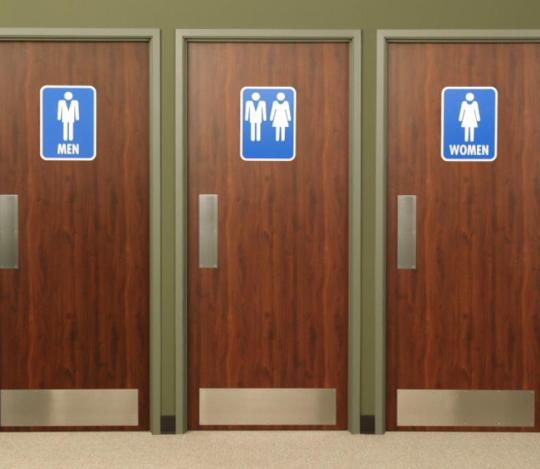
Of course, I’m not suggesting that unisex bathrooms (or unisex locker rooms) be the ONLY option in public places. As it is, lack of funding and space limitations make the integration of new unisex restrooms (as part of existing facilities) a major challenge.
I don’t support colleges, universities, and K-12 schools making unisex spaces into the ONLY option for students. Whenever we divert from the status quo, people should always be given a choice. Some women prefer to only shower, urinate, and change clothes in front of other women. Likewise with men who’d rather limit their showering, urination, and changing clothes to being done in front of other men. For this reason, sex-segregated facilities should remain as an option in our schools, restaurants, gyms, day spas, and athletic centers.
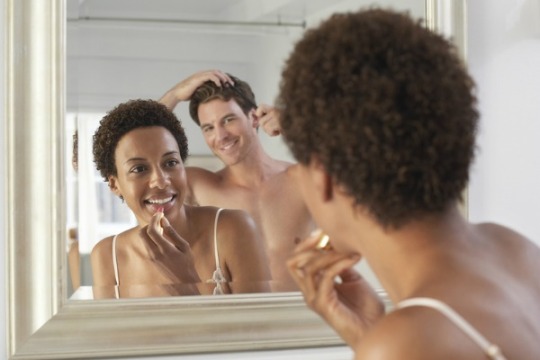
I wouldn’t have wanted to use a communal dorm bathroom (used by both guys and girls) back when I was in college, because I was a bit modest and preferred only letting other guys see me in various stages of undress (at least, when I was sober).
However, if I have to use the bathroom really badly in a particular (emergency) instance, I wouldn’t mind using a unisex bathroom as long as I had access to a private stall.
So how can we accommodate the needs of different people?
One solution is for cities and municipalities to mandate that all single-occupancy restrooms be made “unisex” by definition. Last year, such an ordinance was proposed in Austin, Texas.

When it comes to children, teenagers, and young adults, the key is to give them the option ahead of time. For instance, the University of Missouri (MU) will provide gender-neutral bathrooms and gender-neutral housing as opportunities for its students this upcoming fall. However, students who wish to live there will have to sign an agreement in advance consenting to living in housing with these unisex features.
State Representative Jeff Pogue (who represents a southeastern district of Missouri) has taken a page from Huckabee’s bluster by sponsoring two bills: one to outlaw this practice altogether, and one to ban any public funding for gender-neutral spaces.

Another remedy would be to repurpose some existing restrooms so there are unisex options in each building. Perhaps the men’s room and women’s room on the second floor of a building could remain sex-segregated after renovation; but the men’s room and the women’s room on that same building’s first floor could both be renovated into unisex restrooms (that are also handicap-accessible).
This has been done on a smaller scale within the Oconomowoc School District (in Wisconsin). Some restrooms previously designated as “faculty-only” have been repurposed into unisex bathrooms available for additional student/parent use.
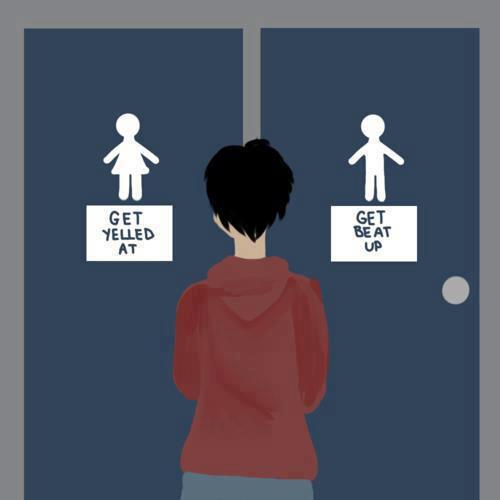
Above all else, unisex facilities need to be made into a core element of future infrastructure funding. This can be done at both the state and federal levels; it’s just a matter of letting lawmakers know that usage of them would be a citizen’s individual choice...instead of a coercive, across-the-board building code.
Please make this clear to the skeptics, whenever you hear them question the clarity of having unisex bathrooms. We cannot allow self-serving bigots such as Huckabee and Pogue to hijack the narrative.
1 note
·
View note
Text
I Love You Ellen DeGeneres, But You’re a Hypocrite

Ellen DeGeneres is a national treasure. Her career has spanned decades from comedian, to actress, to talk show host and she was a trailblazer for the LGBTQ community. She’s warm, funny, charitable, and overall seems like a decent human being.
But even the greatest of human beings can be hypocrites.
During an interview with Matt Lauer on NBC’s Today, she was asked if she’d invite President Trump onto her show. She’s said “no”, which sparked an applause by her audience who was present during the sit-down. When Lauer pressed why, she said this:
“Because I’m not gonna change his mind. He’s against everything that I stand for. We need to look at someone else who looks different than us, and believes in something that we don’t believe in and still accept them and still let them have their rights.”
There’s so much to analyze in this response.
First, as a host of a talk show, is it really your duty to “change his mind”? The entire premise of an interview is to invite a person to sit down and to simply ask questions, not debate them.
Second, her “he’s against everything that I stand for” is such an overdramatic cliché. I get it, liberals think Trump is a bigoted antichrist, but what he really stood for during the election was economic prosperity and national security. That’s what he ran on. Are those some things Ms. DeGeneres stands against? I’d assume not. And in regards to LGBT issues, President Trump went on record saying he has no intention of reversing same-sex marriage and he personally believes transgender people should use the bathroom they want (although it’s worth noting that he rescinded the Obama administration policy that punishes schools for not allowing transgender students to use the bathroom of their choice, which liberals see is an attack on the transgender community than limiting the powers of the executive branch and allowing states to decide for themselves).
However, it’s the following sentence in her response that makes her a hypocrite.
She says we need to look at people who “look different than us” and “believe in something that we don't” and still accept them. She’s literally banning President Trump from her show because he believes something that she doesn’t (I won’t even get into the fact that she’s also discriminating against orange people).
But even if Ellen DeGeneres finds President Trump appalling, which frankly is understandable, she clearly has used such logic on all Republican politicians.
Not once during the election did she invite GOP candidates like Ted Cruz, Marco Rubio, Ben Carson, Carly Fiorina, or even John Kasich, whose only memorable moment during the entire election was when he expressed his support for gay marriage at the first Republican debate. Meanwhile, she had Hillary Clinton on her show three separate times and Bernie Sanders once during the election.
She’s willing to accept people on her show who don’t have her skin color or gender identity, but isn’t willing to accept people who don’t align with her politics. In other words, diversity to her is literally only skin deep when in reality, diversity in thoughts and opinions are what really makes us unique.
There isn’t an official ban of Republicans from coming on her show. In 2015, she sat down with Caitlyn Jenner, who identifies as a Republican and they spoke about Jenner’s transition as well as her views on things like same-sex marriage. But then DeGeneres appeared on The Howard Stern Show and was expressing her confusion about how a transgender woman like Caitlyn Jenner wasn’t “completely onboard” with same-sex marriage. She adds, “I think a lot of Republicans are wishing she wasn’t Republican,” which is pretty closed-minded on DeGeneres’s part. Jenner alleges in her new book that Ellen DeGeneres tried to “alienate her from members the LGBTQ community” because of her views. DeGeneres also had a fairly nonpolitical interview with Former President George W. Bush recently.
Let me be clear, Ellen DeGeneres can have anyone she wants on her show. I’m not dictating that she should have President Trump. But her logic as to why she won’t is at best flawed and at worst is completely hypocritical. Her double standard only does a disservice to herself and to her nationwide audience, which no doubt has a substantial number of self-identified Republicans and conservatives. It’s a shame that someone as beloved as DeGeneres is only feeding into the political divide instead of uniting the country by embracing an honest discussion.
Ellen DeGeneres is one of the greatest entertainers of our generation. Her bravery of coming out so publicly 20 years ago will forever be remembered and her remarkable work since has made a major impact in American culture. But bravery today in Hollywood is rising above petty politics. Sadly, she’s in good company.
#Ellen DeGeneres#Ellen#Finding Dory#Finding Nemo#Dory#Trump#President Trump#Caitlyn Jenner#Donald Trump#President Donald Trump#GOP#Republican#Republicans#Conservative#Conservatives#Liberal#Liberals#Marco Rubio#Hillary Clinton#Feel the Bern#Bernie Sanders#LGBTQ#lgbt#hollywood#Ted Cruz#Carly Fiorina#Ben Carson#John Kasich
0 notes
Text
The Immaculate Concession: Washington Post’s Jennifer Rubin Posts Bizarre Claim Involving The Democratic Counsel From Trump Impeachment Hearing
Today, I defended the New York Times for an opinion piece that is the basis for a defamation lawsuit by the Trump campaign. Raising such free speech protections can be challenging when you disagree with the author (as I did). It is particularly difficult when you are also the subject of a false representation in a column, as I was this week. Unlike the New York Times column, a representation of Jennifer Rubin in the Washington Post was demonstrably false as a factual matter. While I am not one to bring actions against newspapers, the inclusion of a clearly false statement (and the failure to correct it) is precisely why many are calling for changing libel laws and attacking the media. Rubin states that I made multiple concessions to Democratic counsel Norm Eisen despite the fact that he only asked me one question about a line that I had just published in the Wall Street Journal. My “concession” appears to be confirming that a line that I had just published on a point that I included in my written and oral testimony. I have asked for a correction from both Rubin and the Post and will update this column with any developments. However, given that this column has been running for days, I wanted to set the record straight.
I rarely call out writers or academics for criticism of my writings or positions. I did so to set the record straight when false accounts were promulgated on the web after my impeachment testimony. Otherwise, such erroneous criticisms goes with the territory. Yet, I have rarely encountered a more demonstrably (and almost comically) false statement as the one that appeared in Rubin’s column.
Norm Eisen
This week the Post ran a column by Rubin entitled “An Unassuming Mover In Impeachment Departs The House.” I was delighted to see a column on my friend Norm Eisen, but I was surprised when I started receiving calls from people about one line that is clearly untrue. The column states that “[Eisen] managed to extract concessions from the Republican witness, Jonathan Turley, that were later used by House managers in the trial.”
As a columnist, including writing for the Washington Post, I understand that such assertions can be highly subjective but on this occasion it is not just false but would have taken little to confirm that it was false. The reason is simple: I was only asked one trivial question by Eisen and the Democrats in the entire hearing.
The sole question that I was asked by Eisen was actually the subject of audible laughs when I was instructed to solely answer “yes or no” to his reading of a line that I had just written in a column in the Wall Street Journal. Here is the entire exchange with Eisen from the coverage:
“And Professor Turley, you recently wrote in the Wall Street Journal, and I quote, ‘There is much that is worthy of investigation in the Ukraine scandal, and it is true that impeachment doesn’t require a crime.'”
“That’s true, but I also added an important caveat,” Turley attempted to interject.
“Sir, it was a yes or a no question,” Eisen continued. “Did you write in the Wall Street Journal, “There is much that is worthy of investigation in the Ukraine scandal, and it is true that impeachment doesn’t require a crime?’ Is that an accurate quote, sir?”
“You’ve read it well,” responded a smiling Turley.
If you watch the hearing, you will hear laughter in the background because the exercise of having me confirm a line I just wrote was a bit bizarre — as was the incidence that I not say a word beyond “yes or no.”
As I explained to the Post, I fail to see how confirming a line that I wrote a week or so earlier in a national publication is a concession of any kind, let alone multiple concessions.
Moreover, I know of nothing in the oral testimony that was different from what I stated in my lengthy written testimony or my oral statement. I stated that previously identified four articles of impeachment, including bribery, were flawed and should be rejected. I stated that two articles could be legitimate but would have to be proven. The Committee rejected those four articles and went forward with the two that I said could be rejected. I previously maintained that position and continue to maintain that position. I also testified that you did not require a crime – a position that I had stated in my testimony, in my prior academic writings, and in my testimony in the Clinton impeachment over 20 years ago. I do not know of any “concession,” let alone multiple concessions, that I made in my oral testimony. Indeed, the coverage of various newspapers noted that I was not asked anything by the Democrats of substance in the entire hearing. I received only the request to confirm a line that I had just written and the result of laughter. When Judiciary Committee Jerry Nadler ended the hearing, he quoted my previously stated position that abuse of Congress, a non-crime, could be an impeachable offense. I came to the hearing with that position, which I have held for decades as an academic in both scholarship and testimony.
That would make this something of an “immaculate concession” devoid of any specific question or answer.
Thus far, my request for a correction has not been granted and column still contains a representation that is demonstrably untrue. Even if Rubin was told this by Eisen or someone else, she does not claim that it is a statement from a third party but a fact. She also did not seek to confirm such concessions or state what those concessions might be.
What is concerning is what seems like an utter lack of concern for the factual record. There is widespread distrust of the bias and accuracy of the media, particularly in coverage of the Trump Administration and impeachment. This only fuels such suspicions that writers are cavalier in asserting such facts and a refusal to correct those assertions when shown to be untrue.
Rubin is a self-described conservative columnist for the Washington Post and is also a MSNBC contributor. She has previously been criticized by conservatives, Fox News, and President Trump as one of the Post’s designated conservative voices. Past controversies include calls to “shun” and “shame” Trump officials and to “burn down the Republican party.” Such criticism, however, can go with the job as a columnist and Rubin is can certainly be anti-Trump and a Republican.
I have a long and valued relationship with the Washington Post, which has generously published many of my columns. I have often defended the Post against attacks by President Trump and others. However, my continuing respect for the Post and our past relationship should not be a deterrent for calling out errors when they occur. This should never have been put into the column and would have been shown to be untrue with minimal fact checking.
The Immaculate Concession: Washington Post’s Jennifer Rubin Posts Bizarre Claim Involving The Democratic Counsel From Trump Impeachment Hearing published first on https://immigrationlawyerto.tumblr.com/
0 notes
Text
Margot Robbie Talks Queen Elizabeth Drag, Gay Brother’s Popularity
After a fierce, Oscar-nominated turn as scandalous skater Tonya Harding in 2017’s I, Tonya, Margot Robbie is off the ice and holding royal court as Queen Elizabeth I in Mary Queen of Scots. Exercising a power over Europe so great during the 16th century’s latter half, nothing could stop Her Majesty – not even her cousin, Mary Stuart (portrayed by Saoirse Ronan).
Their vicious and ultimately deadly contention, the result of Mary’s request to be Elizabeth’s heir, is chronicled with delicious matriarchal bite for the #MeToo era, glamorous period-film beauty (those gowns!) and one very infamous beheading in director Josie Rourke’s diverse doozy of a historical drama. Beau Willimon’s screenplay also turns a tender, heartbreaking eye to Elizabethan Era queerness via Italian courtier and Mary’s friend and private secretary, David Rizzio, known in the film simply as Rizzio and portrayed by Ismael Cruz Cordova.
Ruler of the box-office in films such as 2013’s The Wolf of Wall Street and 2016’s Suicide Squad, as hammer-wielding warrior Harley Quinn, a role she will reprise in 2020 for a Harley-centered spin-off, Birds of Prey (and the Fantabulous Emancipation of One Harley Quinn), the 28-year-old Australian actress is a queen in her own right.
Read on for Robbie’s essential tips for drag queens looking to perfect their Elizabeth look (hint: no arsenic) – plus, talk about her “too gay to function” brother Cameron Robbie, whom she considers her best friend, and a career highlight: watching Martin Scorsese direct a gay orgy.
youtube
What tips do you have for drag queens looking to transform themselves into Queen Elizabeth I?
(Laughs) Well, you definitely want to avoid getting smallpox – you have to really layer on the makeup to hide those pox-mark scars! So avoid that at all costs. For a drag makeover, I could give you a list of what not to do: number one, don’t put lead and arsenic in your makeup the way Queen Elizabeth did because, uh, it really could shorten your life. And I love that she stuck to the red hair and went with the even more vibrant color red and the more elaborate hairstyles as the years progressed.
The contrast with the white makeup, it really worked on her.
Mmhmm! Serious contrasting. I mean, she had very thin eyebrows – I don’t think that’s really the style these days. Not really in vogue right now.
But if you really set yourself apart…
Exactly. If you wanna make it clear that you’re really heading toward Queen Elizabeth, yeah, the thin eyebrows are a definite giveaway. White makeup. Fiery red wigs. And just bedazzle yourself. Jewels everywhere!
They wore their jewelry in a different way. Instead of wearing necklaces and bracelets and earrings, which they did do, jewels and diamonds and rubies were sewn into their outfits, which I thought was really amazing. Then when they would get undressed – at the end of it their ladies in waiting would undress them – the jewels would just scatter to the floor and someone would have a dustpan and sweep them up for the next outfit.
When you read the script, were you surprised by the film’s queerness? And were you disappointed that Mary got a gay “sister” friend in Rizzio and you didn’t?
Yes! I was very jealous of Mary’s plot in general. I think it was actually a big part of it, that Elizabeth was more isolated. I think that was kind of self-inflicted; she had such a mistrust in almost everyone around her and had a very cynical nature out of self-preservation, therefore she isolated herself. Even with the gowns, you see over the years, as they get bigger and bigger, she’s literally keeping people at arm’s length at all times. So, I was very jealous that I didn’t have the same (relationship) as Mary and Rizzio. So very unfair. (Laughs)
What about this time period were you most surprised by?
I was interested to kind of discover that the Renaissance period was much more liberal in terms of sexuality than it is today. It’s interesting to kind of consider that, or to recognize how we just put labels on everything today. We label everything, and in doing so we often simplify often-complicated things. We’re so quick to say, “This person’s straight, this person’s bisexual, this person’s gay, this person’s Republican, this person’s whatever,” and we label everything.
But in terms of sexuality, the Renaissance period, they were far more fluid about sexuality, and bisexual wasn’t really a term that had to be placed on someone – it was very common for men to be married and also sleep with other men. That wasn’t something that people felt the need to label.
So that was really interesting, and then on the flip side the women at the time, particularly female monarchs, literally were a body. That was their commodity. Producing a male heir was kind of their purpose and once they had done that and achieved their purpose they were kind of swept aside. So, it was interesting to see, on one side, how liberal and open sexuality could be at the time – but, on the other side, how women were seen as a commodity, and not more than a conduit for their male successor.
youtube
Shifting to your portrayal of Tonya Harding, did you know that you were playing someone who many in the LGBTQ community consider a queer icon?
I did not realize that at the time. I did hear that, and I thought, “Oh, she’s got some pretty fun skate costumes!” But tell me more about that.
It’s her underdog status.
Underdog status – I love that, yes. Well, as an Aussie, we always gravitate toward underdog stories, anyway, so yeah, that’s one of the reasons I played her.
Is being an underdog an Aussie thing?
Yeah, yeah. Always. The country identifies itself as an underdog itself and has that mentality of fighting for your place, so I love underdog stories.
You’ve long fought for LGBTQ underdogs. You were a staunch supporter of marriage equality before Australia finally legalized same-sex marriages. You even wore a “Say I Do Down Under” shirt when you hosted Saturday Night Live in 2016. December marks the one-year anniversary of that landmark ruling. How did you celebrate the legalization of same-sex marriage in Australia last year?
Honestly, I almost didn’t feel like celebrating because I was so upset that it took them that long to legalize it. I feel like when it was legalized across America that’s when I really wanted to celebrate. I thought, “Wow, this is a long way for America to come.” America, to me, holds such conservative Christian values, generally speaking, so for that to happen in America was like, “Wow, this is really a time to celebrate.”
Australia is awesome and can be so progressive, but the fact that we were so late in doing that upset me so deeply that I truly almost didn’t want to celebrate because I thought they didn’t deserve celebration.
Too little, too late, Australia?
(Laughs) Yes, too late, Australia! No, no; it was bittersweet. Of course I was happy and proud that we finally joined the 21st century in that regard, but at the same time, it was bittersweet. I really felt it should’ve been done a lot sooner.
You have a brother, Cameron, who has described himself on Instagram as “too gay to function.” Are you aware of the gay community’s interest in your brother?
No! But I’m sure he would love to hear that. He’s awesome. I have two brothers and a sister, but Cameron and I were particularly close growing up. He’s always been my best friend – since he was born, really. So, he would be thrilled to hear that. He would really appreciate that.
How did he come out to you?
Well, I guess that’s kind of his story to tell. I wouldn’t feel right to speak on his behalf. But like I said, he’s my best friend, as are all my siblings. I love them endlessly and always will.
Does he take you to gay bars?
I’ve been going to gay bars and clubs since I got my ID – and probably long before that! There was this fantastic gay club in Melbourne, so when I turned 18 – 18 is the legal drinking age in Australia – and while I was living in Melbourne we used to always go, because on a Saturday night they would do a musical drag performance. It was always incredible. I don’t know how they would get it together every week. I don’t know where they found the time or the costumes; they had the costumes put together, the musical art, the choreography. But every Saturday night we would go to this club and just have the best time ever. And I remember they did this one musical performance about Wicked and it was just the best thing you’ve ever seen. So, I’ve been going to gay clubs ever since I’ve legally been able to go to clubs. I always have more fun.
Those queens are gonna be very proud to see you as an actual queen.
Yes, I hope so!
Iconically, you walked in on a gay orgy dressed in Versace in The Wolf of Wall Street. Was that a first for you?
That was a first for me. I can’t say that I’ve walked in on any gay orgies in the past.
RELATED:
youtube
In a Versace outfit, no less.
In the most fabulous Versace outfit you’ve ever seen! I really wish that they got more screen time – I don’t think you ever get to see them – but they were incredible vintage Versace boots buckled all the way up to mid-calf.
Hate to break it to you, Margot, but I don’t think that scene was about your boots.
Yeah, yeah, yeah, I don’t think anyone was looking at the boots. But to watch Martin Scorsese choreograph a gay orgy was truly a highlight of my career. He really approached it with as much professionalism and dedication as any other scene in the movie. I mean, a lot of the scenes are absolutely crazy with so much happening, but to see him sort of choreograph the gay orgy was truly a wonderful experience.
I had read that Scorsese even brought in another choreographer, Michael Arnold, to help organize the shoot.
Oh yeah! It was intricate. There was a lot going on. It was wonderful to be a part of it, though.
In August, DC Comics confirmed that Harley Quinn and Poison Ivy are married, and in 2020, you will play Harley in her own movie. For Birds of Prey, are you mindful of the way Harley is portrayed when it comes to her sexuality?
Yeah. If you read the comics you know that Poison Ivy and Harley have an intimate relationship. In some comics they convey it as a friendship; in other comics you can see that they’re actually sexually involved as a couple. I’ve been trying to – I would love to have Poison Ivy thrown into the universe, because the Harley and Poison Ivy relationship is one of my favorite aspects of the comics, so I’m looking to explore that on screen.
Have you considered who you’d want as Poison Ivy?
You know what? I’ve thought about it a lot and there’s no one person who springs to mind. I’m pretty open-minded.
You have your own production company, Lucky Chap, which is committed to producing female-led films. How conscious are you of LGBTQ inclusion in the films and TV shows your company produces?
Our goal for the company has always been to tell female-driven content with as many female filmmakers as possible. As far as including content for the LGBTQ community, that’s a huge aspect. We make movies for audiences to love. A huge portion of the audience is a part of the LGBTQ community, so we obviously wanna make content for everyone. I don’t know if anyone could say that they don’t have someone close to them who isn’t a part of that community, so of course it’s important. It’s a part of everyone’s life; everyone’s gonna relate to those stories. We have a lot happening, actually, at the company, especially on the TV side. I’m not sure when they would actually be released – nothing’s been announced yet – but what I can say is, absolutely. We always wanna make stories for everyone.
from Hotspots! Magazine https://hotspotsmagazine.com/2018/12/20/margot-robbie-talks-queen-elizabeth-drag-gay-brothers-popularity/
from Hot Spots Magazine https://hotspotsmagazine.tumblr.com/post/181271531145
0 notes
Text
Margot Robbie Talks Queen Elizabeth Drag, Gay Brother’s Popularity
After a fierce, Oscar-nominated turn as scandalous skater Tonya Harding in 2017’s I, Tonya, Margot Robbie is off the ice and holding royal court as Queen Elizabeth I in Mary Queen of Scots. Exercising a power over Europe so great during the 16th century’s latter half, nothing could stop Her Majesty – not even her cousin, Mary Stuart (portrayed by Saoirse Ronan).
Their vicious and ultimately deadly contention, the result of Mary’s request to be Elizabeth’s heir, is chronicled with delicious matriarchal bite for the #MeToo era, glamorous period-film beauty (those gowns!) and one very infamous beheading in director Josie Rourke’s diverse doozy of a historical drama. Beau Willimon’s screenplay also turns a tender, heartbreaking eye to Elizabethan Era queerness via Italian courtier and Mary’s friend and private secretary, David Rizzio, known in the film simply as Rizzio and portrayed by Ismael Cruz Cordova.
Ruler of the box-office in films such as 2013’s The Wolf of Wall Street and 2016’s Suicide Squad, as hammer-wielding warrior Harley Quinn, a role she will reprise in 2020 for a Harley-centered spin-off, Birds of Prey (and the Fantabulous Emancipation of One Harley Quinn), the 28-year-old Australian actress is a queen in her own right.
Read on for Robbie’s essential tips for drag queens looking to perfect their Elizabeth look (hint: no arsenic) – plus, talk about her “too gay to function” brother Cameron Robbie, whom she considers her best friend, and a career highlight: watching Martin Scorsese direct a gay orgy.
youtube
What tips do you have for drag queens looking to transform themselves into Queen Elizabeth I?
(Laughs) Well, you definitely want to avoid getting smallpox – you have to really layer on the makeup to hide those pox-mark scars! So avoid that at all costs. For a drag makeover, I could give you a list of what not to do: number one, don’t put lead and arsenic in your makeup the way Queen Elizabeth did because, uh, it really could shorten your life. And I love that she stuck to the red hair and went with the even more vibrant color red and the more elaborate hairstyles as the years progressed.
The contrast with the white makeup, it really worked on her.
Mmhmm! Serious contrasting. I mean, she had very thin eyebrows – I don’t think that’s really the style these days. Not really in vogue right now.
But if you really set yourself apart…
Exactly. If you wanna make it clear that you’re really heading toward Queen Elizabeth, yeah, the thin eyebrows are a definite giveaway. White makeup. Fiery red wigs. And just bedazzle yourself. Jewels everywhere!
They wore their jewelry in a different way. Instead of wearing necklaces and bracelets and earrings, which they did do, jewels and diamonds and rubies were sewn into their outfits, which I thought was really amazing. Then when they would get undressed – at the end of it their ladies in waiting would undress them – the jewels would just scatter to the floor and someone would have a dustpan and sweep them up for the next outfit.
When you read the script, were you surprised by the film’s queerness? And were you disappointed that Mary got a gay “sister” friend in Rizzio and you didn’t?
Yes! I was very jealous of Mary’s plot in general. I think it was actually a big part of it, that Elizabeth was more isolated. I think that was kind of self-inflicted; she had such a mistrust in almost everyone around her and had a very cynical nature out of self-preservation, therefore she isolated herself. Even with the gowns, you see over the years, as they get bigger and bigger, she’s literally keeping people at arm’s length at all times. So, I was very jealous that I didn’t have the same (relationship) as Mary and Rizzio. So very unfair. (Laughs)
What about this time period were you most surprised by?
I was interested to kind of discover that the Renaissance period was much more liberal in terms of sexuality than it is today. It’s interesting to kind of consider that, or to recognize how we just put labels on everything today. We label everything, and in doing so we often simplify often-complicated things. We’re so quick to say, “This person’s straight, this person’s bisexual, this person’s gay, this person’s Republican, this person’s whatever,” and we label everything.
But in terms of sexuality, the Renaissance period, they were far more fluid about sexuality, and bisexual wasn’t really a term that had to be placed on someone – it was very common for men to be married and also sleep with other men. That wasn’t something that people felt the need to label.
So that was really interesting, and then on the flip side the women at the time, particularly female monarchs, literally were a body. That was their commodity. Producing a male heir was kind of their purpose and once they had done that and achieved their purpose they were kind of swept aside. So, it was interesting to see, on one side, how liberal and open sexuality could be at the time – but, on the other side, how women were seen as a commodity, and not more than a conduit for their male successor.
youtube
Shifting to your portrayal of Tonya Harding, did you know that you were playing someone who many in the LGBTQ community consider a queer icon?
I did not realize that at the time. I did hear that, and I thought, “Oh, she’s got some pretty fun skate costumes!” But tell me more about that.
It’s her underdog status.
Underdog status – I love that, yes. Well, as an Aussie, we always gravitate toward underdog stories, anyway, so yeah, that’s one of the reasons I played her.
Is being an underdog an Aussie thing?
Yeah, yeah. Always. The country identifies itself as an underdog itself and has that mentality of fighting for your place, so I love underdog stories.
You’ve long fought for LGBTQ underdogs. You were a staunch supporter of marriage equality before Australia finally legalized same-sex marriages. You even wore a “Say I Do Down Under” shirt when you hosted Saturday Night Live in 2016. December marks the one-year anniversary of that landmark ruling. How did you celebrate the legalization of same-sex marriage in Australia last year?
Honestly, I almost didn’t feel like celebrating because I was so upset that it took them that long to legalize it. I feel like when it was legalized across America that’s when I really wanted to celebrate. I thought, “Wow, this is a long way for America to come.” America, to me, holds such conservative Christian values, generally speaking, so for that to happen in America was like, “Wow, this is really a time to celebrate.”
Australia is awesome and can be so progressive, but the fact that we were so late in doing that upset me so deeply that I truly almost didn’t want to celebrate because I thought they didn’t deserve celebration.
Too little, too late, Australia?
(Laughs) Yes, too late, Australia! No, no; it was bittersweet. Of course I was happy and proud that we finally joined the 21st century in that regard, but at the same time, it was bittersweet. I really felt it should’ve been done a lot sooner.
You have a brother, Cameron, who has described himself on Instagram as “too gay to function.” Are you aware of the gay community’s interest in your brother?
No! But I’m sure he would love to hear that. He’s awesome. I have two brothers and a sister, but Cameron and I were particularly close growing up. He’s always been my best friend – since he was born, really. So, he would be thrilled to hear that. He would really appreciate that.
How did he come out to you?
Well, I guess that’s kind of his story to tell. I wouldn’t feel right to speak on his behalf. But like I said, he’s my best friend, as are all my siblings. I love them endlessly and always will.
Does he take you to gay bars?
I’ve been going to gay bars and clubs since I got my ID – and probably long before that! There was this fantastic gay club in Melbourne, so when I turned 18 – 18 is the legal drinking age in Australia – and while I was living in Melbourne we used to always go, because on a Saturday night they would do a musical drag performance. It was always incredible. I don’t know how they would get it together every week. I don’t know where they found the time or the costumes; they had the costumes put together, the musical art, the choreography. But every Saturday night we would go to this club and just have the best time ever. And I remember they did this one musical performance about Wicked and it was just the best thing you’ve ever seen. So, I’ve been going to gay clubs ever since I’ve legally been able to go to clubs. I always have more fun.
Those queens are gonna be very proud to see you as an actual queen.
Yes, I hope so!
Iconically, you walked in on a gay orgy dressed in Versace in The Wolf of Wall Street. Was that a first for you?
That was a first for me. I can’t say that I’ve walked in on any gay orgies in the past.
RELATED:
youtube
In a Versace outfit, no less.
In the most fabulous Versace outfit you’ve ever seen! I really wish that they got more screen time – I don’t think you ever get to see them – but they were incredible vintage Versace boots buckled all the way up to mid-calf.
Hate to break it to you, Margot, but I don’t think that scene was about your boots.
Yeah, yeah, yeah, I don’t think anyone was looking at the boots. But to watch Martin Scorsese choreograph a gay orgy was truly a highlight of my career. He really approached it with as much professionalism and dedication as any other scene in the movie. I mean, a lot of the scenes are absolutely crazy with so much happening, but to see him sort of choreograph the gay orgy was truly a wonderful experience.
I had read that Scorsese even brought in another choreographer, Michael Arnold, to help organize the shoot.
Oh yeah! It was intricate. There was a lot going on. It was wonderful to be a part of it, though.
In August, DC Comics confirmed that Harley Quinn and Poison Ivy are married, and in 2020, you will play Harley in her own movie. For Birds of Prey, are you mindful of the way Harley is portrayed when it comes to her sexuality?
Yeah. If you read the comics you know that Poison Ivy and Harley have an intimate relationship. In some comics they convey it as a friendship; in other comics you can see that they’re actually sexually involved as a couple. I’ve been trying to – I would love to have Poison Ivy thrown into the universe, because the Harley and Poison Ivy relationship is one of my favorite aspects of the comics, so I’m looking to explore that on screen.
Have you considered who you’d want as Poison Ivy?
You know what? I’ve thought about it a lot and there’s no one person who springs to mind. I’m pretty open-minded.
You have your own production company, Lucky Chap, which is committed to producing female-led films. How conscious are you of LGBTQ inclusion in the films and TV shows your company produces?
Our goal for the company has always been to tell female-driven content with as many female filmmakers as possible. As far as including content for the LGBTQ community, that’s a huge aspect. We make movies for audiences to love. A huge portion of the audience is a part of the LGBTQ community, so we obviously wanna make content for everyone. I don’t know if anyone could say that they don’t have someone close to them who isn’t a part of that community, so of course it’s important. It’s a part of everyone’s life; everyone’s gonna relate to those stories. We have a lot happening, actually, at the company, especially on the TV side. I’m not sure when they would actually be released – nothing’s been announced yet – but what I can say is, absolutely. We always wanna make stories for everyone.
from Hotspots! Magazine https://hotspotsmagazine.com/2018/12/20/margot-robbie-talks-queen-elizabeth-drag-gay-brothers-popularity/
0 notes